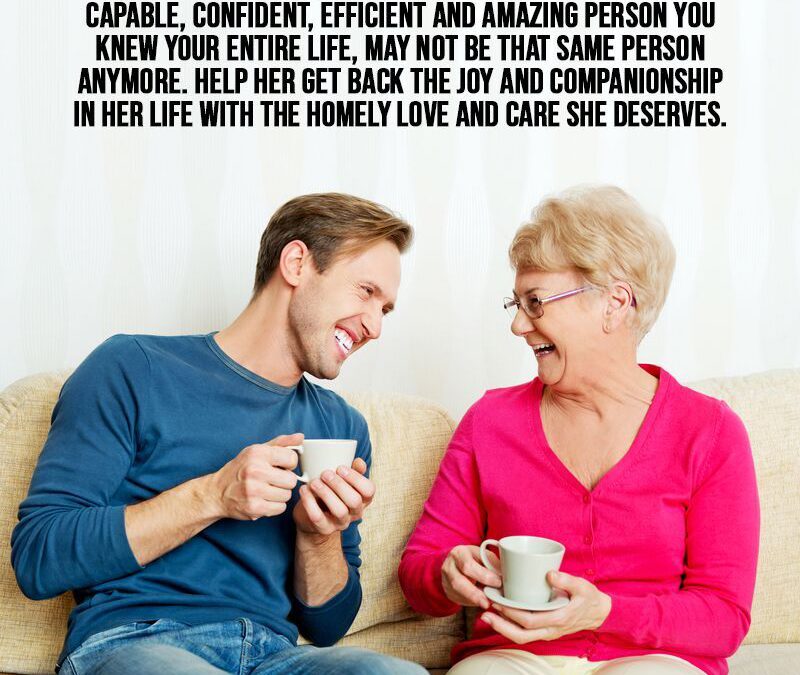As kids, our moms were our superwomen. They seemed to have so many balls up in the air and managed to juggle all of them effortlessly. Their home chores, work commitments, kids’ responsibilities and social life. Our moms were our source of strength and guidance; and our support when things went wrong. They seemed to be able to manage it all! But as of late, you may find that her seemingly endless energy is flagging. The pace is lagging and the gait has slowed.
Are you contemplating assisted living for your mom?
It is completely heart wrenching to think that the capable, confident, efficient and amazing person you knew your entire life, may not be that same person anymore. It can be a difficult fact to accept; that old age is catching up slowly but surely. It is painful to see the inevitable infirmity and the change that time has wrought. For most people, the idea of shifting a loved one to an assisted living facility is a difficult one to contemplate.
And how do you even decide whether or not to opt for assisted living? The decline is almost always gradual and often imperceptible for those who are closest. Is this the right time? Does your mom really need assisted living? Any or all of these could be the sign that mom would benefit by being in an assisted living facility:
1. The telltale signs.
Changes in ability are usually easier to spot – such as between couples in long-term, intimate relationships where companionship itself prevents decline and where one’s partner can spot any change quickly and before further deterioration. However, if your mom lives alone, you may find the telltale signs more difficult to spot. Here are the signs you should keep your eye on. You should watch out for things like forgetfulness of common things: taking medications on time, paying bills, forgetting birthdays or events. Things she used to easily remember. Maybe she walks with a bit of stoop now, maybe her gait has altered from purposeful to shuffling now. Perhaps her shoulders seem more bowed than before? Perhaps she has difficulty carrying things, doing simple chores around the house. The thing to watch out for is any change or deterioration of any sort rather than specific symptoms.
2. Frequent injuries.
She may make light of the cut on her finger from when she was chopping vegetables. She may dismiss the bruise on her arm which she says is just the result of her banging into something in the night. It could even be something more serious such as slipping in the bath or taking a tumble on the stairs. The fact that she seems to be getting hurt or injured more often than normal, is itself a cause for concern. It points to declining physical strength and a lack of physical coordination. She may manifest her increasing infirmity/immobility in other ways: stairs are becoming more and more difficult and painful for her to navigate, or maybe she avoids driving.
3. She is no longer as house proud as she used to be.
This is another sign mom could benefit from assisted living: the woman who used to keep a sparkling clean house and attractive garden no longer seems up to the task; worse she no longer seems very bothered about it. If you see a layer of dust, the dishes or laundry piling up, clutter, weeds in the garden…this is an indication she needs more care. If your mom recently seems a little sloppy in the way that she dresses, where earlier she was always well groomed and neatly turned out and perfectly made-up, this is also your indication that times have changed and you need to take action for the woman who was always taking action on your behalf.
4. She is not her usual sociable self.
Maybe she doesn’t meet up with her friends as much as she used to. Perhaps she finds excuses not to attend family functions or reunions. Maybe she no longer seems to have as much inclination to play or engage with her grandkids as she used to enjoy. She seems to be withdrawing from or seems to be losing enthusiasm for the things that interested her for so many years: physical activities, the theatre, movies, travel.
5. She is losing weight.
Losing some amount of body mass is a natural consequence of aging and not necessarily a cause for concern. However when that weight loss is significant and seems to be too rapid to be normal, you must take charge of the situation. The weight loss could mean that she is neglecting her diet or is finding it difficult to cook and/or eat the things that she was used to eating. Weight loss could also indicate an underlying medical condition; which could also require attention and monitoring.
For any of a number of reasons, you may find that your mother may be both happier as well as safer and better cared for in assisted living. You may find that she is too proud to ask for help, but once you offer it she is more than receptive to the idea. It may take some encouraging. A visit to the options in her area can help her see a new chapter in her life. Help her ease into a life that’s brighter than living alone, one that is safer than struggling to keep up on her own, one that is healthier, happier and, well, homey.


